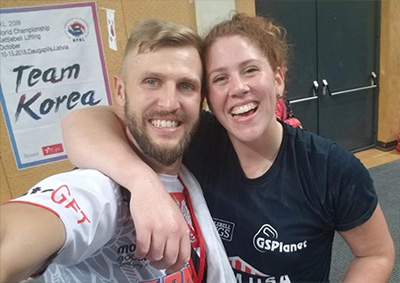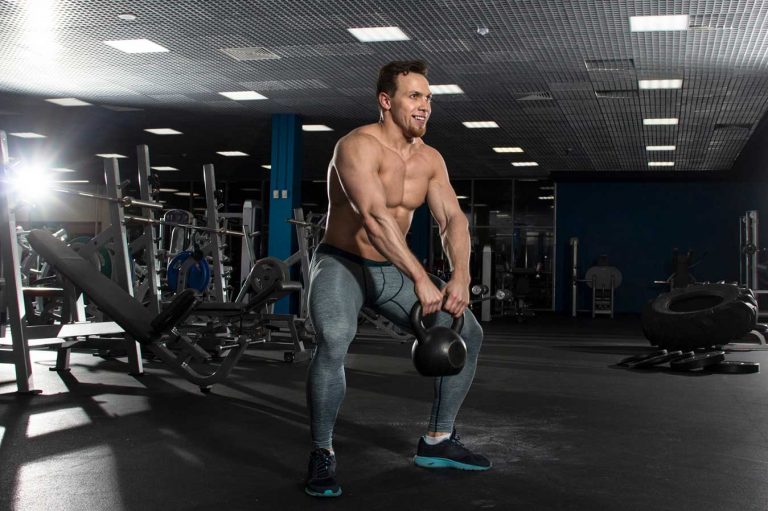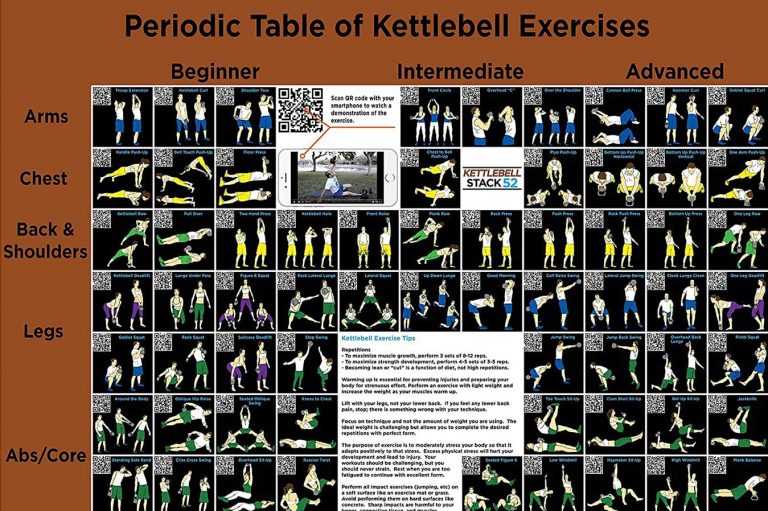A lot of the focus on this website emphasizes weight loss and health benefits from using kettlebells. However, there is another aspect that deserves recognition. Kettlebell sport, where lifters compete against one another, is becoming more popular every year. This is especially true for countries in the western hemisphere such as the U.S. and Canada.
Kettlebell Kings recently wrote an overview of kettlebell sport and what it entails. The goal is to complete the most reps of a specific lift within a certain time frame, typically 10 minutes. Each lift needs precise form and technique or it doesn’t count. It requires a lot of strength, endurance, and mental toughness.
Unless you’ve personally used kettlebells, it may be difficult to fully appreciate what athletes accomplish in both preparing for and competing in kettlebell sport. An article from the Daily Citizen caught our attention detailing Wisconsin native Jordan Tyjeski’s journey to competing in the Kettlebell Sport World Championship held in Latvia earlier this month. It’s a remarkable story that left us wanting more.
Shortly after the competition ended, we reached out to Jordan hoping to learn more about her experience. She graciously agreed to answer several of our questions regarding what her time was like at the Kettlebell Sport World Championship. We certainly learned a lot about the competitive side of training with kettlebells!
Jordan Tyjeski Interview
The Daily Citizen article states that you’ve been using kettlebells for roughly 10 years. However, about a year ago you decided to train for kettlebell events and competitions. What prompted you to make this decision?
I just transferred from UW-Stevens Point, where I played tennis and threw shot, disc and hammer for the track and field team. When I moved to Chicago to continue my education I was looking to keep in shape. By chance, I stumbled into a boxing gym that offered kettlebell classes. The coach for the training sessions competed in sport, and he would train his class in Kettlebell Sport. I did not know the sport existed, but that was the style of the class so I just went with it!
You’ve given a lot of credit to your coach, Tom Dade, for your training and preparation for the Kettlebell Sport World Championship. What was it like working with him?
It was a shock for me to have a coach who doesn’t always speak English while teaching his class; his first language is Polish! I learned to watch him just as much as listen to him. But overall it is a blast. Tom is very high-energy and very intense. He has spent a lot of time helping everyone’s form and teaching us by example of what it takes to be a Kettlebell champion. He pushes everyone in the class and takes training very seriously.

Jordan with Coach Tom Dade
Photo courtesy of Jordan Tyjeski
Speaking of training, what’s your kettlebell collection like? How many would you say you own and what range of sizes? Do you train solely with competition kettlebells or do you also use the regular style too?
My personal collection is very small. I only own a couple of bells. However, my dad has bought quite a few for his home gym and my fiancé has accumulated some as well (which he keeps at my dad’s gym). The three of us together have about 16 competition bells and 14 regular bells. Our regular bells range from 10 pounds to 205 pounds but now that I compete in sport I do not use regular bells on a daily basis.
Before we get into the events, let’s talk about your time in Latvia. Did you have time for any sightseeing or exploring? The Daugavpils Olympic Center seems impressive in its own right.
I did not do much exploring in Latvia. I wanted to spend my time there supporting the other lifters on Team USA. I visited some stores and restaurants but most of my time was spent at the Olympic Center. Most of my sightseeing was in Poland where my coach is from; he played tour guide and got to show off his country to us.
You won gold medals in the 16kg snatch, 16kg long cycle, and 20kg long cycle. Two of those events were won by 2 reps or less. What’s it like being on stage competing at that level?
For my first event, 16kg snatch, I was so excited to compete that I did not pay attention to the other competitors enough to know what number I had to get to win! My plans were to just go as fast as I could. My pace for snatch depended entirely on the judge; all judges slowed down the competitors making sure they had exaggerated pauses at the lock out. So for snatch, my frustration was being forced to go slower than I practiced: I train with 22 reps a minute and only ended up being allowed to go about 20 reps per minute. Since there was an obvious block for me that my team and coach could pick up on, there was a lot of extra support from the audience, including cheering and coaching!
For 16kg TALC I was incredibly nervous. I watched the flight before me, where a girl in my weight class lifted for 115 reps, which was 8 reps over my previous PR! That is the first time I felt real pressure. I was running the numbers in my head for how many reps per minute I needed to get to win and it was way faster than my coach and I had discussed for my pace. I started my set with 12 reps per minute and by minute two I was not sure I could keep the pace up, especially with having judges so strict on form. But I have never wanted a number so bad in my life. I had already won one gold medal and I was so hungry for more that I worked harder than I ever have. The pressure and adrenaline combined to win by one rep.
My 20kg TALC I had no pressure for. I had less than an hour after my 16kg set, had 4 open blisters on my hands, got called on to the platform after being chalked and belted to receive my second gold medal, and did not get added to this event until a week before the competition. Getting on to the platform, I was only thinking about doing my best… that made a difference in the first 5 minutes. However, when I realized that my pace was good enough to potentially win, I started getting more amped. I knew my coach realized the same thing because he started yelling louder and encouraged me to pick up my pace.
Overall, there is almost no difference for me competing in a big meet or a small meet. Wherever I am, it is me versus the clock; I keep my pace, control my breathing, and make sure every rep is perfect. This meet is the first time I have ever noticed what is happening to the audience. The last stretch of my 16kg TALC I heard a “USA” chant from up in the bleachers and I used that energy to speed up and finish my set. I later learned that the members of Team USA did not even start that chant!
Posted by Jordan Tyjeski on Saturday, October 20, 2018
Team USA looks to have been well-represented. Was there a lot of support among one another or was there more of a focus on individual goals?
There was a huge amount of support from everyone on the team. Everyone focused on their individual goals but still made a point to cheer and assist teammates however they could. Since our team was so spread out, I only knew a handful of people on the team before meeting at weigh-ins! This made it hard to understand their performance expectations, but it is just as easy to cheer during their lifts. We may have started the competition as strangers, but every one of us left as friends.
For those of us unfamiliar with the scoring in kettlebell sport, I’m wondering if you could briefly describe what counts as a rep. Do you have an idea of how many total reps (official and unaccounted for) were performed in any given event? Is there such a thing as a perfect run?
A rep is different for each event. You have jerks, snatches, and long cycle. All three lifts need fixation, which means the bell needs to 100% stop moving while overhead. There can not be any swaying or twisting. It is hard to describe a perfect rep because every judge has a different opinion. Some think there just needs to be fixation while the bells are overhead, while others think there needs to be an additional pause to count. It is so hard to get an average rep count because the weights and ages of the athletes and the weights of the bells vary so much. I would say a perfect run is possible if every rep counts!
We know how supportive your coach has been, but your parents also made the trip to watch you compete. What do they think about your success in the Kettlebell Sport World Championship?
I spoke to them about this very subject while we were over there! They said it sounds silly, but they kinda take for granted that I would win! I have done well in the sports I have played, and my kettlebell journey has been so fast and crazy we underestimated the significance of this meet. They said they were always incredibly proud, but once they realized what winning this meet meant, it was even more exciting. My dad started training for kettlebell sport around the same time I did and he loves the sport! He will train with me in our gym in the basement of his office, and since he is a chiropractor he will give me adjustments before or after every workout! He even adjusted athletes on Team USA and Team Poland while we were in Latvia!
Given this success, where do you want to go from here? The Daily Citizen reports that you have a career outside of kettlebells lined up, but do you have any aspirations in becoming a trainer or advocate for the sport as well?
This year I only competed as an amateur. Amateur women use 16kg while professionals use 24kg. Now that I am ready, I want to move up to the professional division and do this all over again! I hope to break a world record in the next couple of years. I would love to teach kettlebells and I love to promote the sport, but I need to grow my career before I add anything else! I returned from Poland/Latvia on Saturday and began my apprenticeship as a Funeral Director at Cress Funeral Homes in Madison, Wisconsin on Monday. I am very excited to be part of the funeral industry and I hope to work with colleagues to show them how important conditioning is in maintaining a long and healthy career.
Last question. What advice would you give to people that might be thinking about making the transition from general kettlebell fitness to competitive sport?
Find a good coach and do whatever they say! It sounds obvious, but it means stripping your form, being uncomfortable, and trusting the process which isn’t always easy! Also, do not ever think you are not good enough or strong enough for kettlebell sport! Wherever you are in your fitness journey is where you start, and you grow from there. There are divisions for amateurs, juniors, and veterans as well. So you are never too old or too young to start competing.



